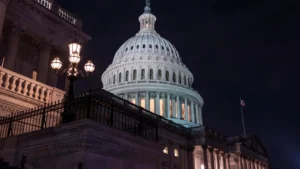WASHINGTON (AP) – In one of Congress’s last acts of the year, the Senate enacted legislation early Saturday to boost Social Security benefits for millions of individuals, advancing a longstanding goal for former public employees.
The bipartisan bill will end long-standing cuts to Social Security benefits for almost 3 million people who receive pensions from the federal, state, and local governments, as well as from public service positions like teaching, firefighting, and law enforcement. It is currently on its way to President Joe Biden for approval. Although it is anticipated to put further burden on the Social Security Trust Funds, proponents contend that the Social Security Fairness Act addresses a decades-old injustice.
Legislation Gains Traction and Passes in Senate
After decades of development, the law finally gathered traction in the last few weeks of the year and was passed just before Congress adjourned for the year. The final vote was 76-20, with all Senate Democrats and 27 Republicans voting in favor of the bill.
For decades, millions of retired educators, firefighters, letter carriers, and state and local employees have been waiting for this day. Senate Majority Leader Chuck Schumer, D-N.Y., declared, “Public retirees will no longer have their hard-earned Social Security benefits stolen from them.”
Two provisions that lower Social Security benefits for people who also get retirement income from other sources, such as state or local government pensions, are repealed by the bill: the Windfall Elimination Provision and the Government Pension Offset.
The cornerstone of our middle class is Social Security. The concept has been supported for years by Sen. Sherrod Brown, D-Ohio, who will leave Congress after losing reelection. “It’s retirement security that Americans pay into and earn over a lifetime,” Brown said.
The existing limitations “make no sense,” he continued. The public is served by these employees. They keep our communities safe. They instruct our children. Like everyone else, they make Social Security contributions.
Impact on Social Security Trust Funds and Federal Deficit
Individuals whose Social Security benefits have been reduced as a result of these rules may shortly notice an increase in their monthly payments. However, the Congressional Budget Office estimates that the increase in payments will also result in an additional $195 billion in the government deficit over the following ten years.
This modification will hasten the program’s insolvency by around six months, starting in 2035, when it was previously anticipated that Social Security Trust Funds would not be able to pay benefits in full. In 2033, the independent Committee for a Responsible Federal Budget estimates that a typical dual-income couple will experience lifetime benefit cutbacks of an additional $25,000.
Opposition and Concerns About Long-Term Viability
Many of the bill’s opponents raised concerns about the program’s long-term viability, even while they agreed that the current cuts are unjust to retirees from public service.
Sen. Thom Tillis, a Republican from North Carolina who voted against the bill, stated, “Instead of doing this on a sustainable basis, we gave in to the pressure of the moment.”
Pressure on Social Security Administration
Additionally, the Social Security Administration, which is currently running at its lowest staffing level in 50 years, would be under more strain as a result of the policy changes. According to an agency spokeswoman, the organization currently employs about 56,400 individuals, the fewest since 1972, although it serves a greater number of people than ever before. Increased funding for the agency, which is now under a hiring freeze, was not included in the stopgap government funding plan that was passed with the Social Security bill.
Republican Support for Fixing Injustice Against Public Service Retirees
However, Republicans who backed the bill argued it was a unique chance to fix what they believe is an unfair part of federal law that hurts retirees from public service.
“They deserve these advantages. This is an unfair, inequitable penalty,” Maine Republican Senator Susan Collins stated.
Future Efforts to Strengthen Social Security
Additionally, GOP backers said they will keep working on more comprehensive reforms to the Social Security system. Despite its efforts to enact significant budget cutbacks elsewhere, President-elect Donald Trump has declared that his administration will not alter Social Security payments.
Republicans in the Senate are also drafting plans to improve the Social Security program’s financial stability, but these plans probably call for lowering payouts. Sen. Rand Paul, a fiscal conservative, suggested raising the Social Security retirement age gradually to 70, but his attempt to include this clause in the measure only received three votes.
Final Remarks on Social Security Reform
“Over the next few years, a lot depends on us getting this right and having the guts to fix Social Security,” Tillis stated. “The day we don’t do it, we will regret it.”
This formatting organizes the article into clear sections and highlights key points effectively while keeping the content unchanged.







.png)





